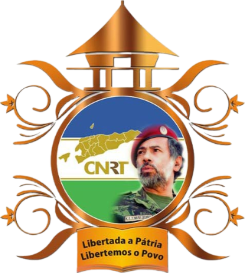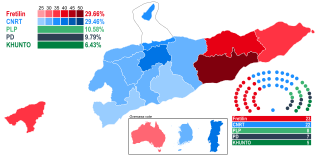
José Alexandre "Xanana" Gusmão is an East Timorese politician. He has served as the 6th prime minister of East Timor since 2023, previously serving in that position from 2007 to 2015. A former rebel, he also served as East Timor's first president since its re-establishment of independence, from 2002 to 2007.

East Timor, officially the Democratic Republic of Timor-Leste, is a country in Southeast Asia and Oceania. The country comprises the eastern half of the island of Timor and the nearby islands of Atauro and Jaco. The first inhabitants are thought to be descendant of Australoid and Melanesian peoples. The Portuguese began to trade with Timor by the early 16th century and colonised it throughout the mid-century. Skirmishing with the Dutch in the region eventually resulted in an 1859 treaty for which Portugal ceded the western half of the island. Imperial Japan occupied East Timor during World War II, but Portugal resumed colonial authority after the Japanese surrender.

The political system in East Timor is a unitary semi-presidential representative democratic republic, whereby the Prime Minister of East Timor is the head of government and the President of East Timor functions as head of state. East Timor has a multi-party system. Executive power is exercised by the president and the government. Legislative power is vested in both the government and the National Parliament. The Judiciary is independent of the executive and the legislature. The East Timorese constitution was modelled on that of Portugal, with lesser power given to the president. The country is still in the process of building its administration and governmental institutions. The Economist Intelligence Unit rated East Timor a "flawed democracy" in 2022.

The Revolutionary Front for an Independent East Timor is a centre-left political party in East Timor. It presently holds 23 of 65 seats in the National Parliament. Fretilin formed the government in East Timor until its independence in 2002. It obtained the presidency in 2017 under Francisco Guterres but lost in the 2022 East Timorese presidential election.

Mari bin Amude Alkatiri is a Timorese politician. He was Prime Minister of East Timor from May 2002 until his resignation on 26 June 2006 following weeks of political unrest in the country, and again from September 2017 until May 2018. He is the Secretary-General of the Fretilin party and was the former President of the Special Administrative Region of Oecusse.

The National Parliament is the unicameral national legislature in East Timor. It was created in 2001 as the Constituent Assembly while the country was still administered by the United Nations, but renamed itself to the National Parliament with the attaining of national independence on 20 May 2002.

Parliamentary elections were held in East Timor on 30 June 2007. The new composition of East Timor's national parliament was determined by the country's population. 529,198 voters were entitled to vote, 708 polling stations were ready.

The National Congress for Timorese Reconstruction is a political party in East Timor founded by former President Xanana Gusmão in March 2007 in preparation for the 2007 parliamentary election.

Francisco Guterres, popularly known as Lú-Olo, is an East Timorese politician who served as 6th president of East Timor from 2017 to 2022. He is also the president of the political party Fretilin, and he was the first president of the National Parliament of East Timor from 2002 to 2007.

José Luís Guterres is an East Timorese politician and diplomat.

The Constitution of East Timor entered into force on 20 May 2002, and was the country's first constitution after it gained independence from Portugal in 1975 and from Indonesia, which invaded East Timor on 7 December 1975 and left in 1999 following a UN-sponsored referendum.

Adaljiza Albertina Xavier Reis Magno is an East Timorese politician and diplomat, and a member of the Fretilin political party.

Parliamentary elections were held in East Timor on 22 July 2017. Fretilin narrowly emerged as the largest party in the National Parliament, winning 23 seats to the 22 won by the National Congress for Timorese Reconstruction, which had been the largest party in the outgoing Parliament.

Early parliamentary elections were held in East Timor on 12 May 2018 after the National Parliament was dissolved by President Francisco Guterres on 26 January 2018.
Maria Madalena Brites Boavida is an East Timorese politician, a member of FRETILIN, and a former Minister of Planning and Finance in the National Parliament of East Timor.

Mariano Sabino Lopes, also known by his nom de guerreAssanami, is an East Timorese politician and a member of the Democratic Party (PD).

Florentina da Conceição Pereira Martins Smith is an East Timorese politician, and a member of the Fretilin political party. Between September 2017 and June 2018, she was the Minister for Social Solidarity under the VII Constitutional Government of East Timor led by Mari Alkatiri. Previously, between 2012 and 2017, she was a member of the National Parliament of East Timor.

Jorge da Conceição Teme is an East Timorese politician and diplomat. Initially, he was a member of the Fretilin political party, but he left that party in 2011 to join the Frenti-Mudança party. He has been Vice Minister of Foreign Affairs and Cooperation, East Timorese Ambassador to Australia, Secretary of State for the Region of Oecusse and Minister of State Administration.

United Nations Administered East Timor refers to the period between 25 October 1999 and 20 May 2002 when East Timor was administered by the United Nations Transitional Administration in East Timor as a United Nations protectorate.

The Democratic Republic of East Timor, was a state that was unilaterally proclaimed on the territory of present-day East Timor on 28 November 1975 prior to the Indonesian invasion of East Timor nine days later on 7 December 1975.




















